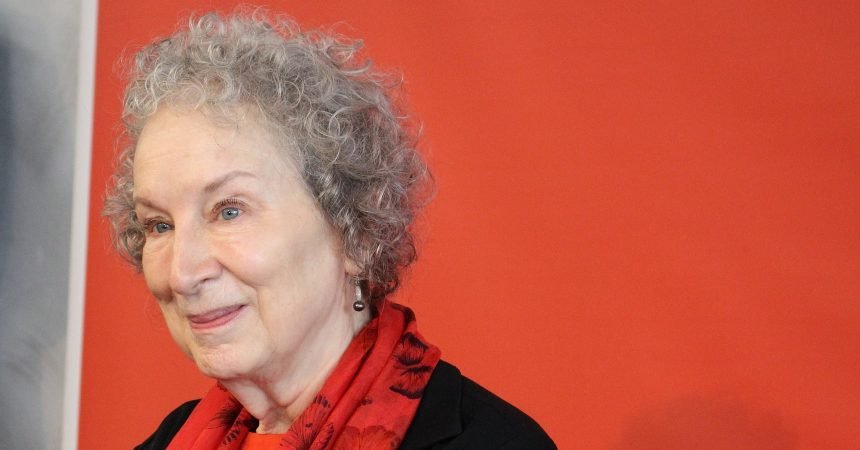“His aim is to confuse the public, so that the citizens – not knowing what to believe – will ultimately believe nothing”.
Renowned author Margaret Atwood said this in a recent article she penned entitled, ‘If we lose the free press, we cease to be a democracy’. She was referring to US President Donald Trump, but it is a tactic used by Prime Minister Joseph Muscat on a regular basis.
The Shift News’ Disinformation Watch series has drawn attention to a number of cases in which the Maltese government has resorted to this tactic to create confusion and sow division among the public.
When only part of the conclusions of the Egrant inquiry were published, Tourism Minister Konrad Mizzi had videos prepared stating that the findings exonerated him, as well as the Prime Minister’s chief of staff Keith Schembri. Muscat himself shed a few tears, even while those around looked on in disbelief.
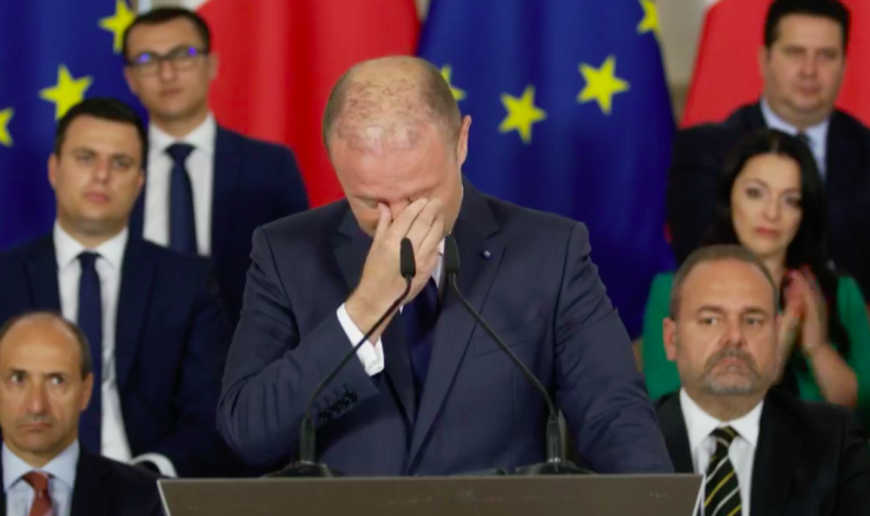
Deputy Prime Ministers Chris Fearne and Chris Cardona look on while the Prime Minister ‘cries’ during his press conference on the Egrant inquiry that is still hidden from the public.
Unless Mizzi is a total moron, and nobody is saying that he is, then he must have known that nothing was further from the truth. But the dose was enough to create confusion, and give blind supporters enough reason to continue singing their anthem for him at Labour Party events.
We have shown how the government regularly uses false statistics to give the impression that all is rosy in Malta, and citizens have never had it better. An effective narrative, based on a number of lies.
The line that electricity bills have been reduced – the Labour Party’s main claim in its electoral campsign – has been shown to be false, but it does not stop them saying it. Not only have they not been reduced, but citizens are forking out additional millions to compensate for a bad deal, according to the assessment by the National Audit Office.
Atwood, whose writing has won numerous awards and honours including the Man Booker Prize, Arthur C. Clarke Award, Governor General’s Award, Franz Kafka Prize, and the National Book Critics and PEN Center USA Lifetime Achievement Awards, has issued a warning in her latest piece:
“We’re living in the midst of a war being waged against this kind of journalism: the evidence-based, truth-telling kind. In the US, the president has admitted that he spews out non-truths to keep the journos spinning. His aim is to confuse the public, so that the citizens—not knowing what to believe—will ultimately believe nothing. In a country with no ideals left, high-level lawbreakers and corruption will have free reign. Who can even object to those who sell out their country if there isn’t much of a country left?”
The author was among 300 influential writers who called on the European Commission “to express profound concern with developments in Malta in the context of the investigation into [Daphne Caruana Galizia’s] assassination, and in particular regarding the behaviour of the management of Valletta 2018, the European Capital of Culture”.
The letter drew attention to the fact that Maltese authorities have not attempted to protect the protest memorial at the Great Siege monument, which has been cleared over 200 times over the last year.
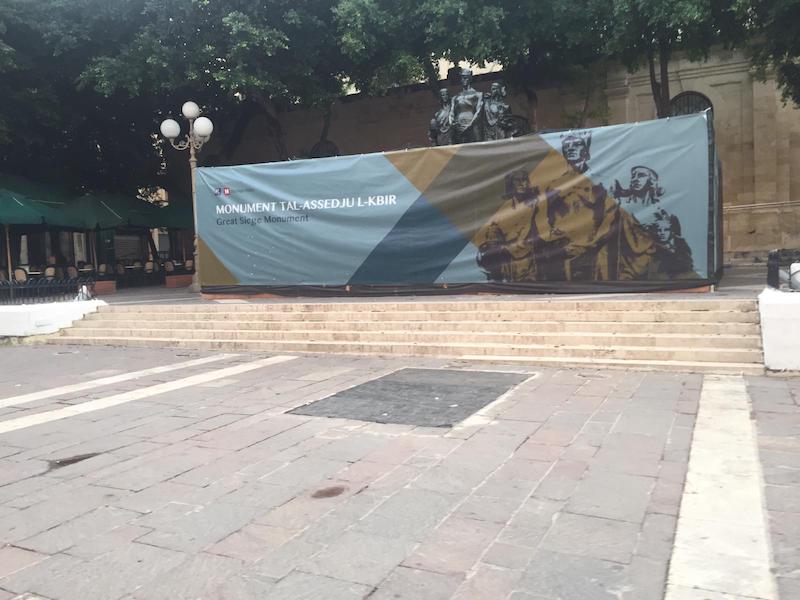
A barricade was erected to prevent public access to the Daphne Caruana Galizia protest memorial, ordered by Justice Minister Owen Bonnici.
“In particular, we are outraged by the comments of Jason Micallef, Chairman of the Valletta 2018 Foundation, and as such the Capital of Culture’s official representative in Malta. Since her assassination, Micallef has repeatedly and publicly attacked and ridiculed Daphne Caruana Galizia on social media, ordered the removal of banners calling for justice for her death and called for her temporary memorial to be cleared. This is far from appropriate behaviour for an official designated to represent the European Capital of Culture,” the authors said.
At the closure of the event, Micallef said he deserved credit for Valletta 2018 and it seems he got it. Micallef won international recognition for all the wrong reasons – causing a diplomatic rift with the European Capital of Culture partner Leeuwarden Friesland, and his mocking of a journalist assassinated under his government’s watch.
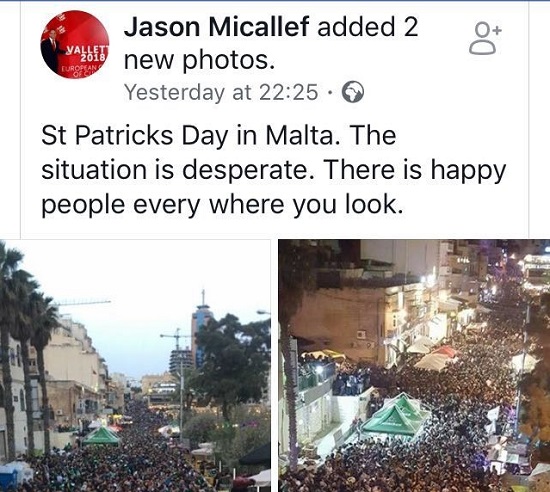
But he was backed by Malta’s justice minister Owen Bonnici who said he would never stand in the way of freedom of expression, except he ordered the barricading of the site where people gathered to demand justice for a dead journalist he himself had mocked. Bonnici’s understanding of free speech needs to go back to the drawing board, international organisations have warned.
“When it comes to pesky journalists who wash dirty political laundry in public, anything goes,” Atwood said in her latest piece.
When the Justice Minister’s face was plastered on the barricade he set up to stop citizens visiting a public monument serving as a protest memorial for the specific issue that people like Atwood are raising, and his reaction was to hit Instagram to ask whether he looked good in the picture, it served as a good example of why international organisations are slamming Malta’s failure to meet its obligation to protect freedom of speech.
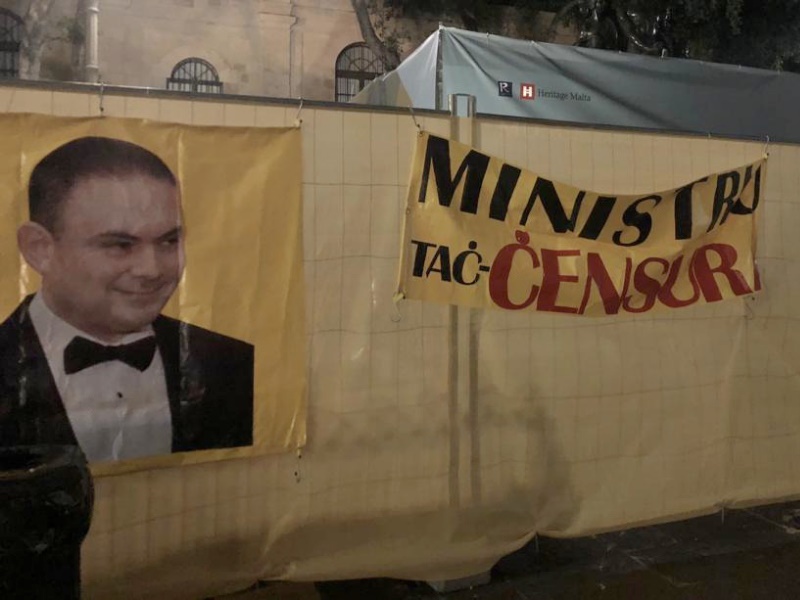
Photo: Rezistenza Malta / Twitter
Atwood says: “Budding totalitarians always go after artists and writers early on, for two reasons: they are relatively undefended—there isn’t a huge armed posse of fellow writers acting as their bodyguards—and they have an unpleasant habit of not shutting up”.
Gone are the days when all we had to defend was the right of novelists to say the F word in print. Now it appears that it is the right of independent-minded journalists to exist at all that is at issue, she adds.
“Democracies ignore this crisis at their peril: if we lose the free press, we will cease to be democracies”.

